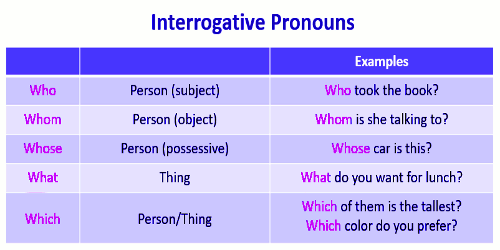Interrogative pronouns are used in interrogative sentences to ask questions.
Les pronoms interrogatifs sont utilisés dans les phrases interrogatives pour poser des questions.
There are five primary interrogative pronouns:
Il existe cinq pronoms interrogatifs primaires:
who, whom, whose, which, and what.
 Most often, interrogative pronouns are used in direct questions, representing the person or thing that is being asked about. In direct questions, the interrogative pronoun usually comes at or near the beginning of the interrogative clause, acting as either the subject or object of the sentence.
Most often, interrogative pronouns are used in direct questions, representing the person or thing that is being asked about. In direct questions, the interrogative pronoun usually comes at or near the beginning of the interrogative clause, acting as either the subject or object of the sentence.
Le plus souvent, les pronoms interrogatifs sont utilisés dans les questions directes, ils peuvent représenter une personne ou une chose pour laquelle la question est posée. Dans les questions directes, le pronom interrogatif vient généralement au début de la phrase, agissant soit comme sujet, soit comme complément d'objet.
• “Who is coming to the party tonight?” (subject)
Qui vient à la fête ce soir?
• “Whom did you ask to fill in for Mr. Smith?” (object)
À qui avez-vous demandé de remplacer M. Smith?
• “Whose is this computer?” (subject)
À qui appartient cet ordinateur?
• “What do you expect me to do, exactly?” (object)
Qu'attendez-vous que je fasse exactement?
An interrogative pronoun is easy to identify because it can stand on its own in a sentence and takes the grammatical function of a noun.
Un pronom interrogatif est facile à identifier car il prend la fonction grammaticale d'un nom.
Other question words, on the other hand, act as adverbs when they stand alone, as in:
• “How did you find me?” (How modifies the verb find.)
• “When are we leaving?” (When modifies the verb leaving.)
• “Why did we stay?” (Why modifies the verb stay.)
Indirect questions are sometimes used to ask something in a more polite way
Les questions indirectes sont parfois utilisées pour poser des questions de manière plus polie
Interrogative pronouns can also appear within indirect questions. When this happens, they appear in the middle of the sentence.
Les pronoms interrogatifs peuvent également apparaître dans les questions indirectes. Lorsque cela se produit, ils apparaissent au milieu de la phrase.
• “Could you tell me whose these are?”
• “Would you mind telling me which I’m supposed to bring?”
• “Do you know what we’re doing here?”
Other times, indirect questions are used for emphasis to convey surprise:
• “She wants who to come to the party?”
• “You’re going to do what in New York City?”
• “He’s going to ask whom out on a date?”
Reported questions are actually a form of declarative sentences using reported speech
Les questions rapportées sont en fait une forme de phrases déclaratives utilisant un discours rapporté
Interrogative pronouns also appear in the middle of reported questions. they tell us about something someone else asked, but do not ask a question themselves. As such, they do not end in a question mark.
Les pronoms interrogatifs apparaissent également au milieu des questions rapportées. ils nous parlent de quelque chose que quelqu'un d'autre a demandé, mais ne posent pas de question eux-mêmes. En tant que tels, ils ne se terminent pas par un point d'interrogation.
• “She wants to know whose these are.”
• “He wondered which is correct.”
• “I asked you what we were supposed to do today.”
• “She was wondering who would be coming tomorrow.”
• “They asked whom to consult in the matter.”


